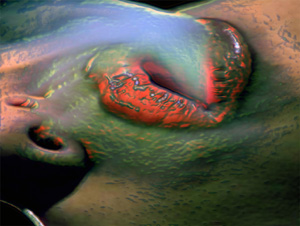What sparked “Summer Swim”? Where do most of your stories start—a memory, an image, or do you start with the first line and just muddle through?
I was working with some word prompts, and mermaid was one of them. This image came to me of a girl in a pool, her paralyzed legs trailing behind her, and the story took off from there. A lot of my pieces start with a singular image of a character in an odd situation.
Your sentences read like some kind of languid, jazzy music. Do you listen to music when you write?
I’m glad that my sentences feel languid to you, because I worry that they are too laconic, always in a rush to get somewhere. I do love sentence rhythm, and reading my work out loud helps me hear the beats. No way can I listen to music when I write. It’s too stimulating. I keep CNN on in the other room, turned down low, for company.
The characters in this story seem to breathe and fill the room—how do you create a character—what’s important to you in discovering a character?
Stuff pops out of my characters’ mouths that gets me in trouble. I give them dialogue, sure, and then I have to listen to what they say and what they leave out. I try to explore what’s being left out through gesture, setting, the sensory details.
I like a story to be honest with me, take me into its confidence, and show me the stuff in people’s lives that doesn’t get out in the light much. And I admire the shape of great stories, how subtle bits you might’ve noticed in the beginning come back at the end when you’ve sort of forgotten them and then there they are, knocking on your heart.
Who controls the fate of your stories, you or your characters? How necessary is tension in your work?
I’m at the tiller, but barely. The reticent, coded stuff in my sentences ruins whatever plan I had for my story. And then I have to figure out what’s really going on, and it’s not usually a place I want to go to just then. But I try, or I leave the story in a file under my desk for a year or five, and go back to it when I understand things better.



 The SmokeLong Grand Micro Contest (The Mikey) is now an annual competition celebrating and compensating the best micro fiction and nonfiction online.
The SmokeLong Grand Micro Contest (The Mikey) is now an annual competition celebrating and compensating the best micro fiction and nonfiction online.